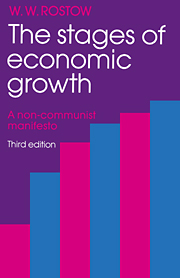Book contents
- Frontmatter
- Contents
- Preface to the Third Edition
- Preface to the Second Edition
- Preface to the First Edition
- 1 INTRODUCTION
- 2 THE FIVE STAGES-OF-GROWTH—A SUMMARY
- 3 THE PRECONDITIONS FOR TAKE-OFF
- 4 THE TAKE-OFF
- 5 THE DRIVE TO MATURITY
- 6 THE AGE OF HIGH MASS-CONSUMPTION
- 7 RUSSIAN AND AMERICAN GROWTH
- 8 RELATIVE STAGES-OF-GROWTH AND AGGRESSION
- 9 THE RELATIVE STAGES-OF-GROWTH AND THE PROBLEM OF PEACE
- 10 MARXISM, COMMUNISM, AND THE STAGES-OF-GROWTH
- Appendix A THE DIFFUSION OF THE PRIVATE AUTOMOBILE
- Appendix B THE CRITICS AND THE EVIDENCE
- Coda: REFLECTIONS ON THE DEBATE AS OF 1990
- Acknowledgments
- Index
3 - THE PRECONDITIONS FOR TAKE-OFF
Published online by Cambridge University Press: 05 June 2012
- Frontmatter
- Contents
- Preface to the Third Edition
- Preface to the Second Edition
- Preface to the First Edition
- 1 INTRODUCTION
- 2 THE FIVE STAGES-OF-GROWTH—A SUMMARY
- 3 THE PRECONDITIONS FOR TAKE-OFF
- 4 THE TAKE-OFF
- 5 THE DRIVE TO MATURITY
- 6 THE AGE OF HIGH MASS-CONSUMPTION
- 7 RUSSIAN AND AMERICAN GROWTH
- 8 RELATIVE STAGES-OF-GROWTH AND AGGRESSION
- 9 THE RELATIVE STAGES-OF-GROWTH AND THE PROBLEM OF PEACE
- 10 MARXISM, COMMUNISM, AND THE STAGES-OF-GROWTH
- Appendix A THE DIFFUSION OF THE PRIVATE AUTOMOBILE
- Appendix B THE CRITICS AND THE EVIDENCE
- Coda: REFLECTIONS ON THE DEBATE AS OF 1990
- Acknowledgments
- Index
Summary
THE TWO CASES
We consider in this chapter the preconditions for take-off: the transitional era when a society prepares itself—or is prepared by external forces—for sustained growth.
It is necessary to begin by distinguishing two kinds of cases history has to offer.
There is first what might be called the general case. This case fits not merely the evolution of most of Europe but also the greater part of Asia, the Middle East, and Africa. In this general case the creation of the preconditions for take-off required fundamental changes in a well-established traditional society: changes which touched and substantially altered the social structure and political system as well as techniques of production.
Then there is the second case. This case covers the small group of nations that were, in a sense, ‘born free’: the United States, Australia, New Zealand, Canada, and, perhaps, a few others. These nations were created mainly out of a Britain already far along in the transitional process. Moreover, they were founded by social groups—usually one type of non-conformist or another—who were at the margin of the dynamic transitional process slowly going forward within Britain. Finally their physical settings—of wild but abundant land and other natural resources—discouraged the maintenance of such elements in the traditional structure as were transplanted, and they accelerated the transitional process by offering extremely attractive incentives to get on with economic growth.
- Type
- Chapter
- Information
- The Stages of Economic GrowthA Non-Communist Manifesto, pp. 17 - 35Publisher: Cambridge University PressPrint publication year: 1991
- 2
- Cited by



